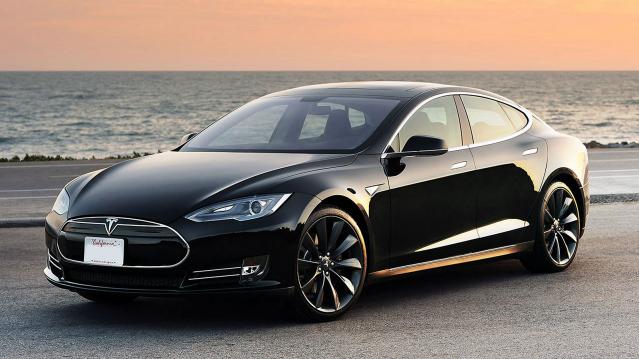A Red-Hot Tesla Burns Rubber on Consumer Reports

The Tesla Model S P85D sedan just broke the Consumer Reports rating system.
By definition, a car can’t exceed a score of 100 on the road test. But after the P85D racked up a score of 103, Consumer Reports was forced to create a new benchmark for the system and overhaul the ratings process according to a news release. The new system caused the car to slip to a score of 100.
A few characteristics of the car that allowed it to perform better in the test than any other car ever before include its rapid acceleration ability (0 to 60 mph in 3.5 seconds), its remarkable energy-efficiency (the car gets the equivalent of 87 miles per gallon) and its better breaking and handling system than the former top-scoring standard Model S. Two years ago, the base model version of the Model S received a 99 out of 100, which at the time was the highest rating ever for a vehicle.
Related: Why Americans Are Keeping Their Cars Longer Than Ever
The report is careful to note that even with a perfect score, the Tesla isn’t a perfect car. Besides a price tag of $127,820, beyond the means of the average person and the most expensive car Consumer Reports has ever reviewed, the car is louder than the base Model S and isn’t as plush as other luxury vehicles.
In addition, a long drive might be problematic if there aren’t any nearby charging stations along the route due to the vehicle’s 200-plus mile range. The rating also doesn’t account for the Tesla’s reliability, but the Model S comes with average reliability, according to owner-survey responses.
Imperfections aside, the car received an enviable final assessment. “It’s a remarkable car that paves a new, unorthodox course, and it’s a powerful statement of American startup ingenuity,” the report reads.
Quote of the Day: A Big Hurdle for the Tax Cuts

“He goes in and campaigns on an issue, and the challenge is he then talks about executing drug dealers. Why do you think the press is going to cover the tax cuts if you’ve given them the much more exciting issue?”
-- Grover Norquist, president of tax-cutting advocacy group Americans for Tax Reform, on President Trump’s failure to sell the tax law.
The Obamacare Mandate That Could Produce $12 Billion in Fines in 2018

Republicans effectively eliminated the individual Obamacare mandate in the tax package signed late last year. Although the new regulation reducing the mandate penalty to zero doesn’t take effect until 2019, President Trump has cited the rule change as a victory over the health law so many conservatives oppose. “Essentially, we are getting rid of Obamacare. Some people would say, essentially, we have gotten rid of it," Trump told a crowd in Michigan two weeks ago.
However, many parts of the Affordable Care Act are still in effect and will continue to operate even after the individual mandate is eliminated in 2019.
In particular, the employer mandate, which requires companies with more than 50 employees to offer health benefits or face fine of roughly $2,000 per worker, will continue to play a significant role in the Obamacare system. The Congressional Budget Office estimates that the mandate will produce more than $12 billion in fines in 2018 alone.
Some conservative groups are pushing lawmakers to stop enforcing the employer mandate, but the IRS is still working to enforce the law. According to The New York Times Monday, the IRS is sending out notices to more than 30,000 businesses that have failed to comply.
Chart of the Day: It’s Still the Economy, Stupid

Security may be the top policy issue for Republican voters, but the economy is the top concern for Democrats, independents and voters overall, according to Morning Consult’s latest polling on the midterm elections. Health care is third on the list, followed by “seniors’ issues.” The results are based on surveys with more than 275,000 registered U.S. voters from February 1 to April 30.
Number of the Day: $13 Billion

An analysis by Bloomberg finds that the roughly 180 companies in the S&P 500 that have reported earnings for the first three months of the year saved almost $13 billion thanks to the corporate tax cut enacted late last year. Those companies’ effective tax rate dropped by more than 6 percentage points on average. About a third of the tax savings went to 44 financial firms.
How a Florida Doctor with Social Ties to Trump Delayed a $16B Billion VA Project

A West Palm Beach doctor who is friends with Ike Perlmutter, the chairman of Marvel Entertainment and an informal adviser to President Trump on veterans’ issues, has held up “the biggest health information technology project in history — the transformation of the VA’s digital records system,” Politico’s Arthur Allen reports. Dr. Bruce Moskowitz “objected to the $16 billion Department of Veterans Affairs project because he doesn’t like the Cerner Corp. software he uses at two Florida hospitals, according to four former and current senior VA officials. Cerner technology is a cornerstone of the VA project. … Moskowitz’s concerns effectively delayed the agreement for months, the sources said.” Read the full story.

